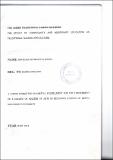The Ameru Traditional naming methods: The effects of Christianity and missionary education on traditional naming culture.
| dc.contributor.author | Kioga, Mburugu M'nkanata | |
| dc.date.accessioned | 2019-06-28T08:53:49Z | |
| dc.date.available | 2019-06-28T08:53:49Z | |
| dc.date.issued | 2014-06 | |
| dc.identifier.uri | http://repository.kemu.ac.ke:8080/xmlui/handle/123456789/480 | |
| dc.description.abstract | In all human communities individuals are identified by names. The process by which these identities are stamped on the person depends on the cultures of the society where the person hails from. Traditionally the Ameru peoples had developed more than two naming methods. The first name of a boy or girl child was given by a caucus of elderly women from the village or family soon after the child was born. The second name given to a Boy-child was by warriors after initiation/circumcision when he was deemed to have attained adulthood. The girl-child never acquired a new or second name until after her marriage. But this traditional system only held sway before the advent of Christianity which invaded the African societies during the late 19th and early 20th centuries. Thereafter Christianity supplanted traditional by injecting totally new and strange naming systems and nomenclatures. The research problem on this study therefore was to explore and explain the Ameru traditional naming methods and systems before the advent of Christianity and how these traditions were impacted by it thereafter. The scope of the study endeavors to answer the research questions and to investigate the problem statement in the research proposal and how to achieve the objectives of the study. The geographical area already covered and the targeted population encompass all the six Meru linguistic dialects spoken within the territorial area inhabited by the community. There is considerable scarcity of written literature on this topic within the entire East Africa Region. The research method which was designed for this study encompassed sample survey using purposive or judgmental method. The data collection methods comprised of key informants interviews, selected respondents for interview schedules and group discussion with identified community elders and sages. The questionnaires were administered by the researcher in person among the more literate young parents and youths. The target population was selected from the knowledgeable elderly members of the community from each linguistic dialects of the Meru peoples. Some older respondents who experienced early missionary conversion to Christianity were also interviewed on the methods adopted by the missionaries to convert the populace into Christianity. The limitation experienced in this research is that with scarce written records the researcher has to almost entirely rely on the fading memories of the older generation who are themselves fast fading away. It is therefore strongly recommended that in order to preserve the African traditions and cultures, the educated Africans do record their traditions in permanent records that will guide the future generations of our peoples. | en_US |
| dc.language.iso | en | en_US |
| dc.publisher | KeMU | en_US |
| dc.subject | Christianity and missionary education | en_US |
| dc.title | The Ameru Traditional naming methods: The effects of Christianity and missionary education on traditional naming culture. | en_US |
| dc.type | Thesis | en_US |

